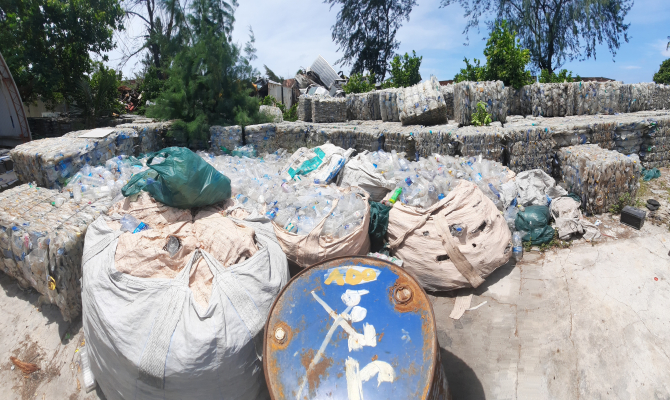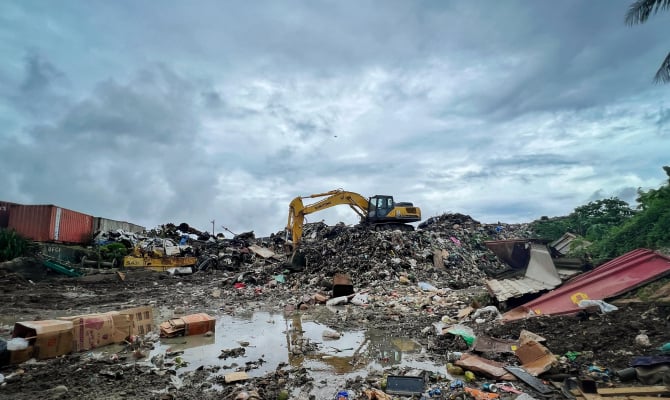A small atoll in the middle of the vast Pacific Ocean, Kiribati, continues to lead the way in dealing with waste and pollution in the region. The progress and the success of the Kaoki Maange System, which has been in operation for close to 15 years, is one way the remote island is punching well above its weight.
As stakeholders in the Pacific waste sector turn their attention to the Third Clean Pacific Roundtable (3rdCPRT), scheduled for 16-25 November 2021, Kiribati’s Ministry of Environment Lands and Agricultural Development (MELAD) is looking forward to sharing their experience in waste management in the hope that it inspires other Pacific nations.
“I believe it is critical that everyone participates in the 3CPRT because we want to share our expertise and experiences on the project (Kaoki Maange System) in Kiribati, as well as learn what other countries are doing,” said Tumai Sue Bwenawa, MELAD’s Waste Minimization and Recycling Project Officer. “Furthermore, countries have the chance to present what actions or programmes connected to the CPRT Strategy have been undertaken in their particular countries.”
The Kaoki Maange System is a container deposit scheme, which collects and pays members of the public after they submit their recyclable materials such as PET Bottles, aluminium cans and acid led batteries. The Recyclable Waste System began as a trial project in 2004 in collaboration with UNDP and the Ministry of Commerce, and was implemented by the Foundation of the South Pacific. Years later, MELAD decided to privatise the system and is now currently run by a local agency known as the One Stop Company.
But the involvement of the Kiribati government remains strong through the Ministry of Finance, Commerce, Audit, local Councils, Customs and MELAD being key stakeholders in the project. Together, they are looking at adding other potential recyclable items such as ELV, glass bottles, used tyres and e-wastes to name a few.
Aside from the hundreds of tonnes of waste collected and removed from the island saving the environment and people, the project has had other benefits.
“The operation of the Kaoki Maange system is supported by the Special Fund Waste Recovery Act of 2004, which was developed at the start of the project. This Act grants the Minister of the Environment the authority or power to impose a levy on any imported items that can be recycled. There is also a Special Fund Regulation of 2005 that sets up the special fund, which the deposit is paid into,” Bwenawa said.
And like most things in life, there are also several challenges. King among them is the poor infrastructure in terms of crushing machineries. In 2018, another challenge surfaced when the buyer of PET bottles stopped accepting them so that now the bottles are stockpiled at a yard, accumulating space. Transportation is another obstacle because the project relied on rental trucks, which sometimes caused delays in collection of recyclable items.
But Kiribati is not letting the challenges stop their efforts in keeping their island home clean.
They have recently introduced a new initiative called “4R’s Bazzar.” The programme simply encourages everyone to repurpose the waste materials (such as plastic bottles, plastic wrappers etc.) that are no longer used by the public and display them for marketing purposes. “This initiative would help lessen the amount of trash from entering the landfill, sea, dumped, burnt and even buried and at the same time earn income for those who are unemployed,” Bwenawa said.
Another new initiative is the Plastic Send Exchange programme which supports the minimisation of plastic litter in the environment both on land and at sea, as well as promoting agricultural practices, in particular home gardening for healthy diets.
Looking ahead to the Third Clean Pacific Roundtable this week, Bwenawa said Kiribati wants to strengthen the development of their national policy and regulation that promotes recycling initiatives. They also want to increase the engagement of the private sector in waste management businesses.
“We also want to conducting more public awareness on the importance of waste management and continue to have strong consultations with local communities, ministries and the private sector on ways we can work together to address waste and pollution, said Bwenawa.
This story was produced by Leanne, published at SPREP on 16 November 2021, reposted via PACNEWS.




